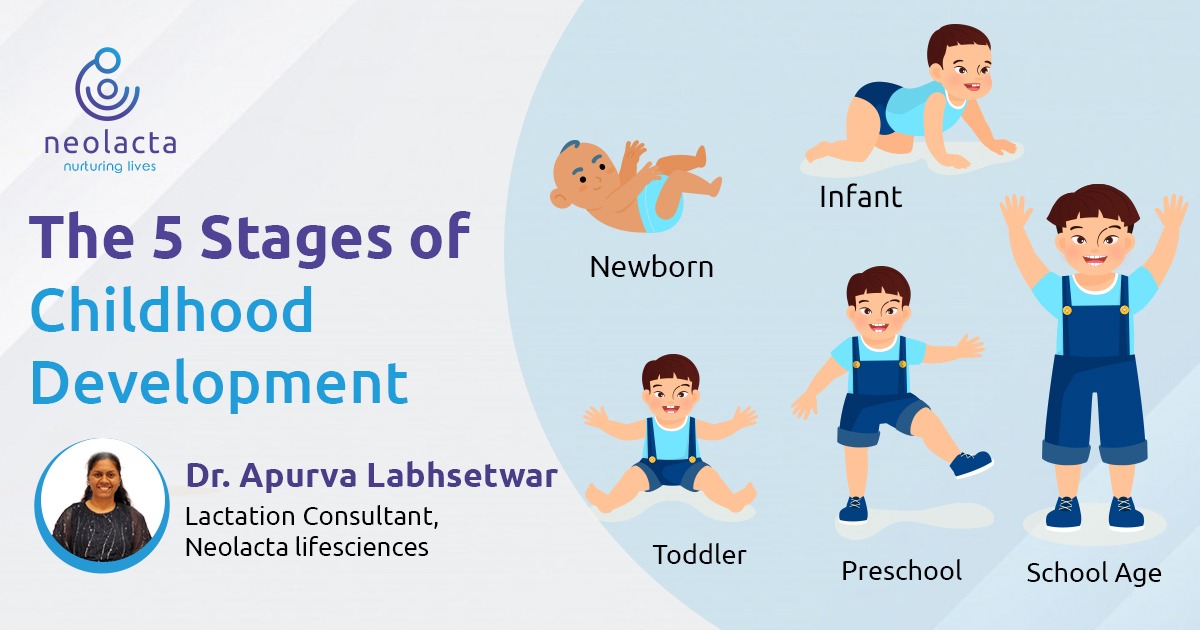What are the 5 stages of Child development?
Child development is a fascinating and complex process that occurs in stages. Understanding these stages can help parents and caregivers provide the best possible environment for a child’s growth and development. In this blog post, we will explore the five stages of child development, which include newborn, infant, toddler, preschool, and school-age.
Newborn Stage
The newborn stage is the first stage of Childhood development and lasts from birth to two weeks of age. During this stage, babies are entirely dependent on their caregivers for survival and have limited abilities. They can only communicate through crying and other reflexes.

During this stage, it’s crucial to ensure proper breastfeeding, hygiene, and care to promote healthy growth and development. Infants in this stage require plenty of sleep, nutrition, and attention to establish a secure attachment with their caregivers. Understanding the newborn stage is critical to providing the necessary support and care to help infants grow into healthy toddlers.
Infant Stage
The infant stage is the first stage of a baby’s life, which typically lasts from birth to 12 months. During this stage, babies experience rapid growth and development in various areas, including physical, cognitive, social, and emotional.

Infants learn through exploration and experimentation, using their senses to understand the world around them. They reach important milestones, such as lifting their heads, rolling over, sitting up, crawling, and eventually walking. They also start to develop their communication skills, using sounds, gestures, and facial expressions to interact with others.
As a parent, it’s crucial to provide a safe and nurturing environment for your baby during this stage. You can support your baby’s development by providing plenty of opportunities for play and exploration, responding to their needs promptly, and providing a healthy diet and regular medical checkups.
Toddler Stage
The toddler stage starts at 12 months of age and lasts until 36 months of age following the infant stage. During this stage, toddlers become more independent and curious about their environment. They learn through play and exploration and develop more advanced language skills.

Toddlers become more mobile and active during this stage, learning to walk, run, climb, and explore their environment. They also develop their language skills, learning to communicate through words and sentences, and they begin to understand and follow simple instructions.
As a parent, it’s important to provide a safe and stimulating environment for your toddler to explore and learn. You can support your toddler’s development by providing age-appropriate toys and activities, setting clear boundaries and routines, encouraging their independence, and providing a healthy diet and regular medical checkups.
Preschool Stage
The preschool stage begins at 3 years of age and lasts until 5 years of age following the toddler stage. During this stage, children continue to develop their physical, cognitive, and social-emotional skills. They learn to follow rules, interact with peers, and engage in more complex play activities.

Preschoolers become more independent during this stage, learning to dress, use the toilet independently, and take care of their own basic needs. They also continue to develop their language and communication skills, as well as their ability to think logically, solve problems, and use their imaginations.
As a parent or caregiver, it’s important to provide a supportive and stimulating environment for your preschooler to learn and grow. You can support your child’s development by providing opportunities for play and exploration, encouraging their curiosity and creativity, and providing positive feedback and encouragement.
Preschoolers also benefit from structured activities and routines, such as attending preschool or daycare, participating in organized sports or activities, and following a consistent daily routine.
School-Age Stage
The school-age stage is the stage of development that follows the preschool stage, typically lasting from 6 to 12 years old. During this stage, children experience significant changes in their physical, cognitive, social, and emotional development.

School-age children continue to develop their physical skills, becoming more coordinated and refining their motor skills. They also experience significant cognitive development, improving their memory, attention, and problem-solving abilities. Additionally, school-age children develop social skills, learning how to interact with their peers and navigate complex social situations.
As a parent or caregiver, it’s important to provide a supportive and stimulating environment for your school-age child to learn and grow. You can support your child’s development by encouraging their interests, providing opportunities for extracurricular activities, and setting clear expectations for behavior and academic achievement.
School-age children also benefit from regular exercise, a healthy diet, and consistent sleep routines. Additionally, parents can support their child’s social and emotional development by teaching them coping skills and helping them navigate challenging social situations.
The school-age stage is also a critical time for academic development, as children begin to develop foundational skills in reading, writing, and math. As a parent or caregiver, you can support your child’s academic success by providing a quiet and organized study environment, monitoring their progress, and collaborating with their teachers.
In conclusion, understanding the five stages of child development can help parents and caregivers provide the appropriate support and care for their children. Each stage is essential and builds upon the previous stage, leading to a well-rounded individual. By providing a nurturing environment, parents can help their children reach their full potential.


